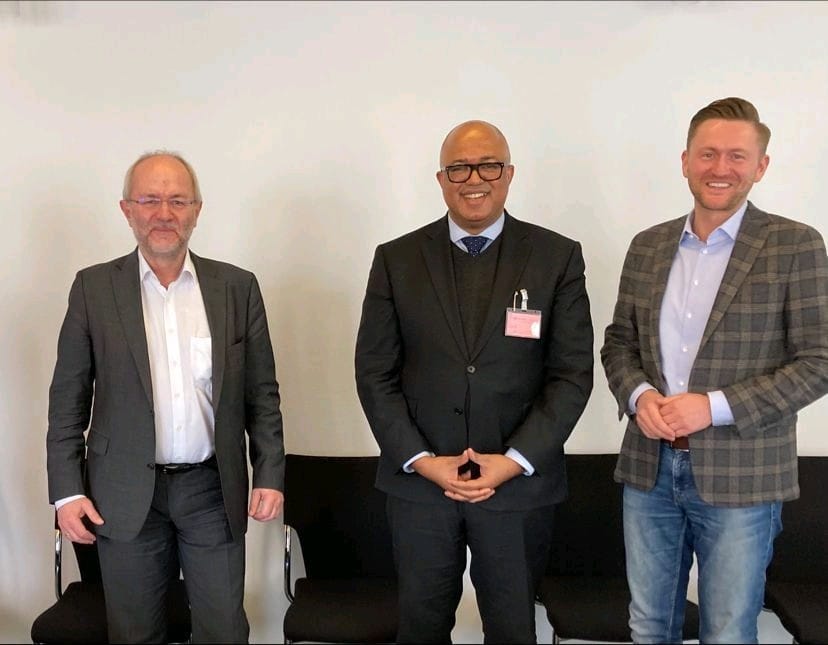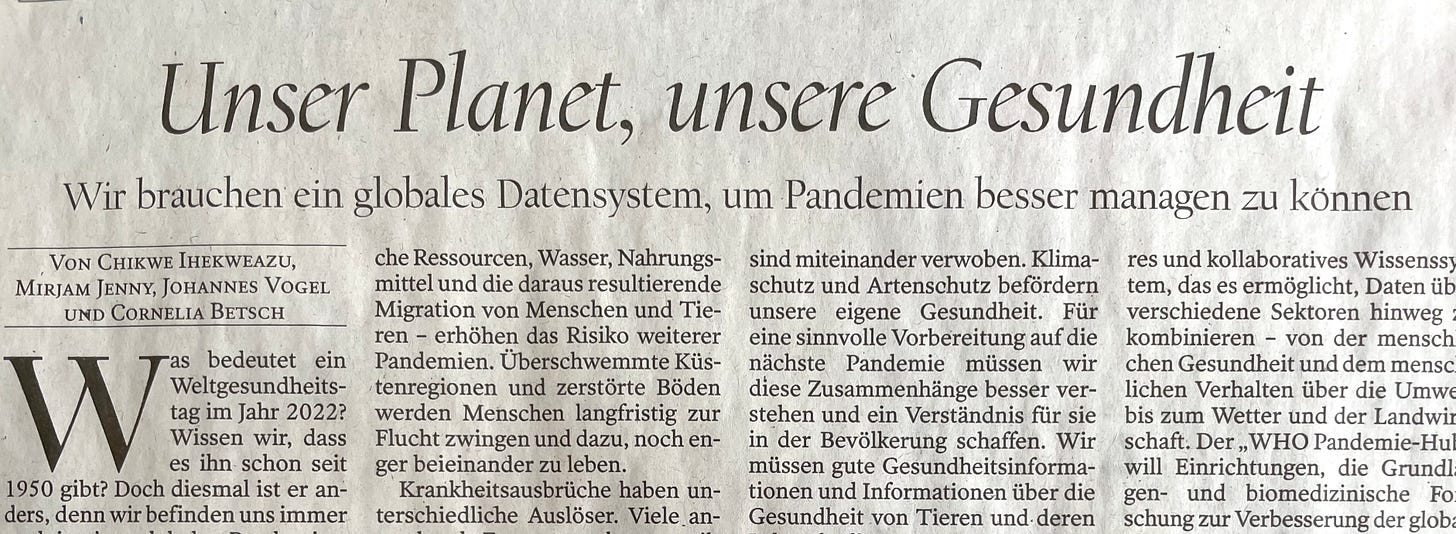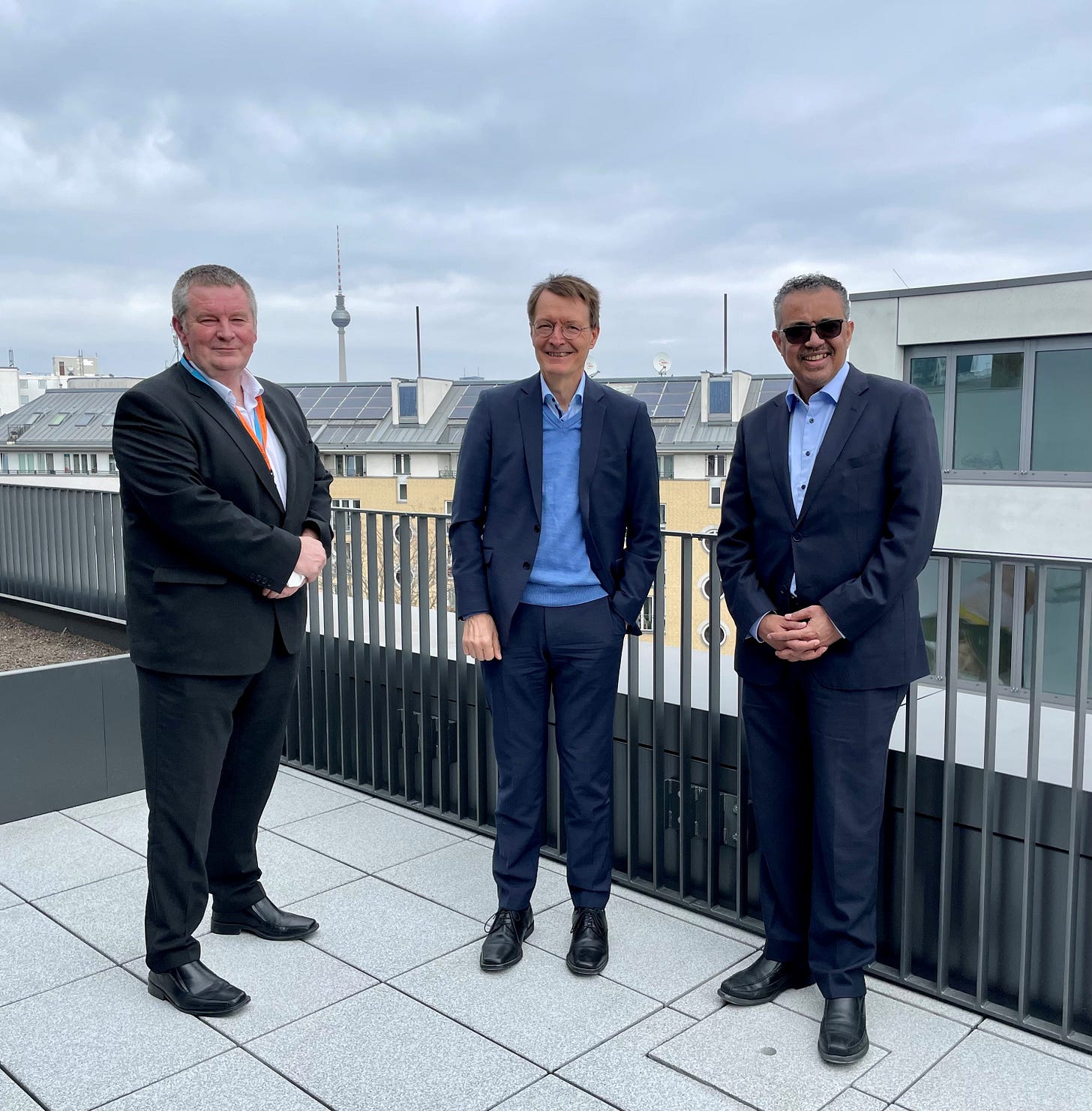News from the WHO Hub for Pandemic and Epidemic Intelligence
A few snapshots of our current activities
First in a series of updates from the WHO Pandemic Hub in Berlin.
The COVID-19 pandemic has shown us how interconnected our lives are and how public health depends on each one of us. The WHO Hub for Pandemic and Epidemic Intelligence will address future pandemic and epidemic risks with better data, better analytics, and better tools for decision making. The Hub is embedded in WHO’s Health Emergencies Programme and is based in Berlin, with political and financial support from the Government of the Federal Republic of Germany. Building on expertise across disciplines, sectors, and regions, the Hub leverages WHO’s convening power to foster global solutions built on an architecture of global trust.
Notes from Dr Chikwe Ihekweazu, Assistant Director-General
As part of our outreach to WHO regions and countries, I traveled to AFRO, EMRO, EURO, and Iraq to discuss country engagement and how to develop the tools and expertise we need for collaborative intelligence. I also visited WHO’s country office in Brazil, where EIOS (and read on for more about EIOS) is one of their flagship products. I met with Brazil’s Minister of Health and visited Fiocruz, a scientific institution for research and development in biological sciences, located in Rio de Janeiro. Check out my Twitter feed for more details.
Prof. Dr. Axel Radlach Pries, MD, Dean of the Charité – Universitätsmedizin Berlin (one of the Hub’s founding partners and where our offices were initially located) and I got together recently. We discussed the Hub’s current activities and plans for continued collaboration.
Over the past month, I have met with several members of the German Bundestag, the national parliament of Germany, to discuss issues of mutual interest around global health security and lessons learned from the COVID-19 pandemic (snapshot from one of those meetings below).
I made several presentations about the Hub, including at:
the Robert Koch Institut (the other founding partner of the Hub, with more than 250 people in attendance; see below for details of our collaboration)
Nature Medicine (on “From the HIV to COVID-19 pandemics: What to expect from the WHO Pandemic Hub”) and
the Giving Pledge (on a panel with Drs. Tom Frieden and Jennifer Nuzzo, moderated by Gabrielle Hamilton).
What we’ve been up to
Publications, projects, planning
We continue to refine our workplan, which extends to 2023 and now comprises 14 projects in various stages of development. All projects are grounded in our mission to support countries and regional and global actors to avert and manage public health threats. In this issue, we highlight two projects.
The Epidemic Intelligence from Open Sources Initiative (EIOS) responds to the world’s need for a strong global public health intelligence community and systems for early detection, assessment, and response to public health threats. It is one of our large, cross-cutting, multi-project initiatives and offers a variety of integrated services to WHO Member States and organizations. EIOS is being accelerated through the Pandemic Hub, with the aim of growing the number of collaborating Member States from 31 to 49 by the end of 2022. The EIOS Core Team recently held a retreat here in Berlin to plan for the rapidly expanding EIOS community.
National Public Health Institutes (NPHIs) are essential to achieving a global system for collaborative intelligence. We are engaging with NPHIs through four projects with our founding partner, the internationally well-connected Robert Koch Institut (RKI). These encompass the development of integrated Surveillance on Antimicrobial Resistance, Integrated Genomic Surveillance, and a collaboration on Public Health Intelligence capacity building and innovation within the EIOS initiative. The GOARN Berlin Fellowship Program (GOBLIN) will provide a unique opportunity for senior experts in the field of epidemic intelligence, surveillance, and rapid response to join the Pandemic Hub in Berlin, hosted by a dedicated unit within RKI.
We convened the first meeting of a new Pandemic and Epidemic Intelligence Innovation Forum (including around 55 innovators in public health surveillance from 16 organizations) over 2 days in February, to share information about activities and investment priorities and to find ways to collaborate on and coordinate projects of mutual interest. A report of the discussions has been published in Eurosurveillance.
We were honoured to be asked to join, in support of the launch of the US Centers for Disease Control and Prevention’s (CDC) new Center for Forecasting and Outbreak Analytics, the White House Summit on Strengthening the Nation’s Early Warning System for Health Threats on 19 April.


In conjunction with World Health Day and this year’s theme, Our Planet, Our Health, we published an op-ed in Der Taggespeigel.
Meeting and greeting
Berlin staff hosted Dr Karl Lauterbach, Federal Minister of Germany for Health, WHO Director-General Dr Tedros Adhanom Ghebreyesus, and Dr Mike Ryan, Executive Director, WHO Health Emergencies Programme on 26 March, before an informal gathering of scientists to discuss pandemic preparedness and response. Minister Lauterbach said that the Berlin Hub would be a critical partner for collaboration and for strengthening the world’s health intelligence capacities.
Coming up
May will be a busy month for global health, with the 75th World Health Assembly and the G7 Health Ministers Conference in Berlin, and more. We will be updating you on these events and others from the Hub.






